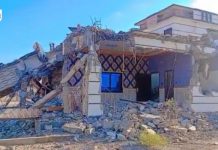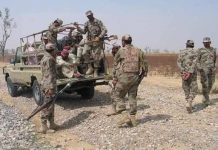Family members of two brothers killed in an alleged “fake encounter” by Pakistani forces in Kalat, Balochistan, have come forward with harrowing details, claiming their sons were taken from their home and shot dead nearby.
Muhammad Ismail, 20, and Muhammad Abbas, 17, were killed by Pakistani forces in the Shesha Daghar area of Kalat on the night of September 7th.
The military’s public relations wing, ISPR, had earlier claimed that two suspected individuals were killed during a “clearance operation” following an intense exchange of fire.
However, the victims’ family has rejected ISPR’s account, describing the incident as a “fake encounter.”
The brothers’ mother recounted how Pakistani forces raided their home at 1 a.m., forcibly took her two sons, and killed them a short distance away. “They threw a grenade into our house and started shooting,” she said, adding that her sons were taken despite her desperate pleas.
Muhammad Ismail reportedly suffered from a medical condition that left him partially paralyzed without daily medication, while Muhammad Abbas worked long hours in the fields to support his family and pay for his father’s medical treatment, as their father is suffering from paralysis.
“I begged them to take my sons to the police station if they had committed any crime,” the mother said. “Instead, they were dragged from my arms and shot dead nearby. Their bodies were dumped in a deserted area.”
The family claims they rushed to the scene after hearing gunfire and found the two brothers’ lifeless bodies riddled with bullets. They insist that no authority has been held accountable for the killings.
This account sharply contrasts the statement made by ISPR, which stated that the operation in Kalat had resulted in the killing of two suspected individuals following reports of suspicious activity in the area.
The incident has heightened concerns in Balochistan, where military operations are often viewed with suspicion. Rights groups and media reports have previously documented cases of staged encounters in the region, with victims frequently being Baloch missing persons who are killed after Pakistani forces suffer losses in attacks by “pro-independence” armed groups.
Human rights organizations and advocates have consistently raised concerns about extrajudicial killings and enforced disappearances in the region. Families of victims have long demanded accountability, transparency, and justice in these cases.






























